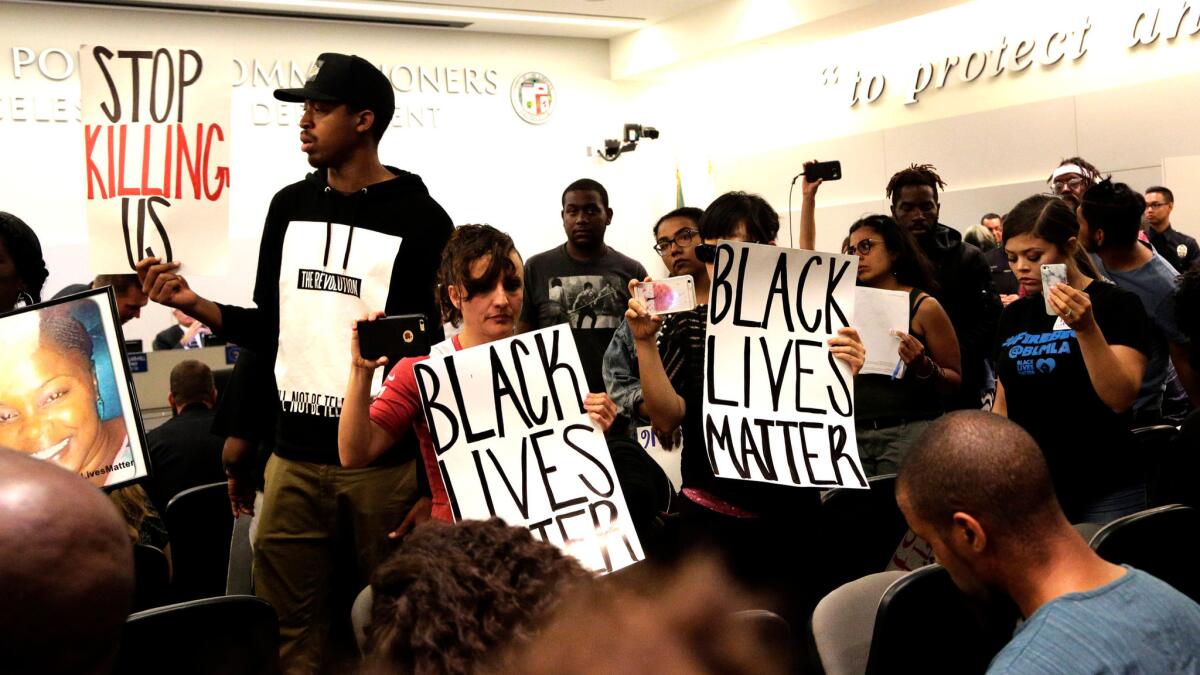Op-Ed: Black Lives Matter is good at raising awareness — but that won’t reduce the number of police killings

- Share via
In South Los Angeles this weekend, protests erupted over the LAPD killing of a black man long before there was enough information to say why, exactly, the officer had used lethal force or if he was justified in doing so. About two weeks earlier, the police killing of a black man in Charlotte, N.C., also triggered protests — again before all the relevant details were public. Both of the men who died were armed.
It’s not hard to understand why some protesters act before all the facts are in. They are outraged by the frequency of police killings. Enough are captured on video, and appear unwarranted when those recordings are released, to keep many African American communities in a state of distrust. Police officers may recoil at being presumed guilty; activists may risk their credibility if they pounce on ambiguous cases; and protests may turn violent. But some in the Black Lives Matter movement still think a speedy reaction is necessary: Not only are immediate protests a means to vent frustration, they also make it less likely that local authorities or the news media will ignore a given killing.
Is [prioritizing awareness] enough to reduce the incidence of future killings?
To my mind, prioritizing awareness — as Black Lives Matter seems to do — makes perfect sense if the goal is to make justice more likely in police killings that have already happened. But is this tactic enough to reduce the incidence of future killings?
Black Lives Matter has certainly succeeded in making black shooting victims household names: Michael Brown, Tamir Rice, Philando Castile, Alton Sterling. The list goes on. And now an allied group of professional athletes are calling attention to the fact that the United States has far more deadly police shootings than any comparable democracy — and that black men are killed disproportionately in those shootings.
By now, Americans know that Black Lives Matter activists want fewer black men killed. The folks in the stands at NFL games understand that the players kneeling during the national anthem, locking arms, or raising fists are drawing attention to the fact that they want cops to stop killing black people. But even sympathizers quickly realize they can’t do much with just that information — except perhaps join an instant protest.
The public needs more specific goals to work toward, so that they can contribute something beyond nodding in empathy.
Think of the most successful protest movement in U.S. history. Circa 1960, “achieve equality under the law” must have seemed like an unsurmountable task. But desegregating a lunch counter seemed possible. So did a voter registration campaign, a bus boycott and a federal Civil Rights Act.
As it turns out, Black Lives Matter has a list of 10 discrete, achievable policy reforms. But they’re seldom mentioned in high-profile settings, such as NFL stadiums, or even on protest signs. Most people have no idea they exist.
According to Radley Balko, author of “The Rise of the Warrior Cop: The Militarization of America’s Police Forces,” the reforms — referred to collectively as Campaign Zero — are “practical, well-thought out, and in most cases, achievable.” He adds that “these are proposals that will almost certainly have an impact, even if only some of them are implemented.”
They include stripping police union contracts of provisions that protect bad cops, ensuring that the prosecutors who decide whether to charge police officers aren’t the same individuals who rely on them for testimony in their cases, forcing police departments to return military-grade weapons to the government and training local law enforcement agencies to handle the mentally ill.
For protesters, “stop killing us” has a raw power that “pass this reform” lacks. Activists are probably correct that simply stating “Black Lives Matter” is a better way to attract attention and draw in allies than wonky details. But it’s the wonky details that shape policing policy. And no matter how aware Americans are of police killings, they will keep happening until policy changes.
More than any instant protest, Campaign Zero matters.
Conor Friedersdorf is a contributing writer to Opinion, a staff writer at the Atlantic and founding editor of the Best of Journalism, a newsletter that curates exceptional nonfiction.
Follow the Opinion section on Twitter @latimesopinion and Facebook
More to Read
A cure for the common opinion
Get thought-provoking perspectives with our weekly newsletter.
You may occasionally receive promotional content from the Los Angeles Times.







